
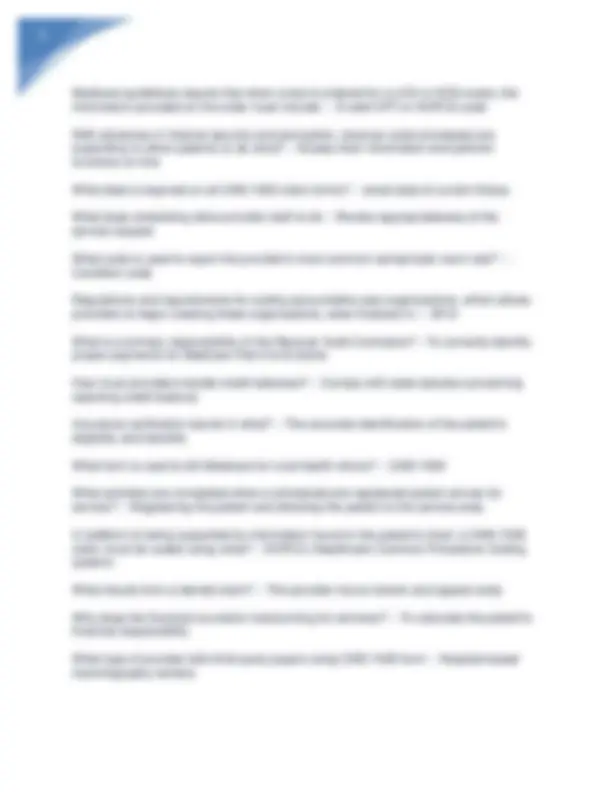
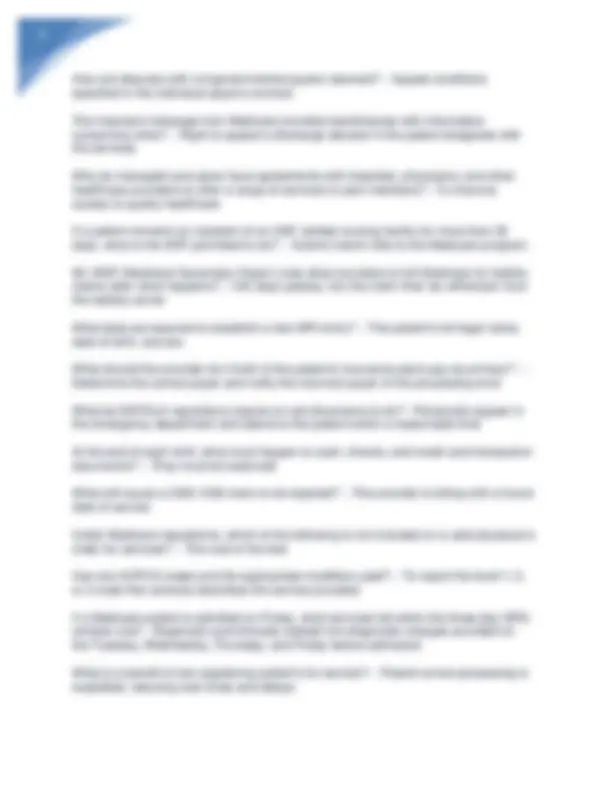
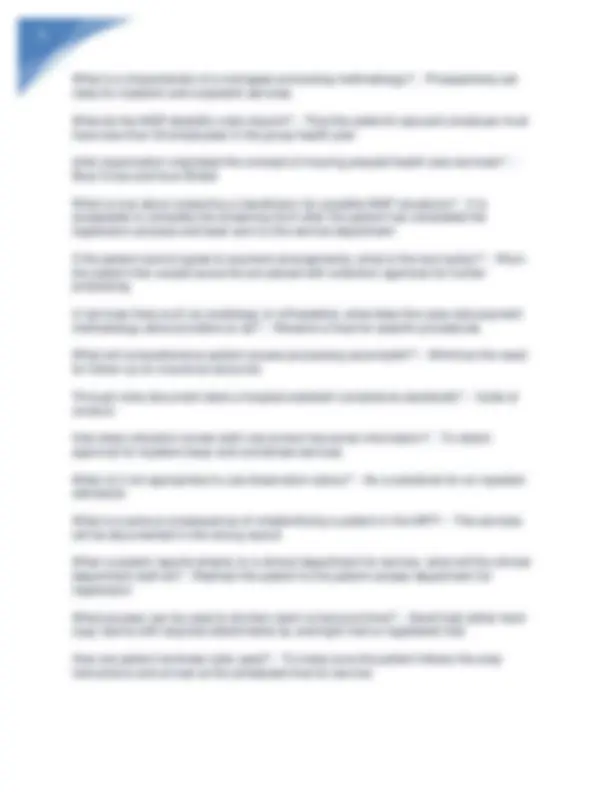
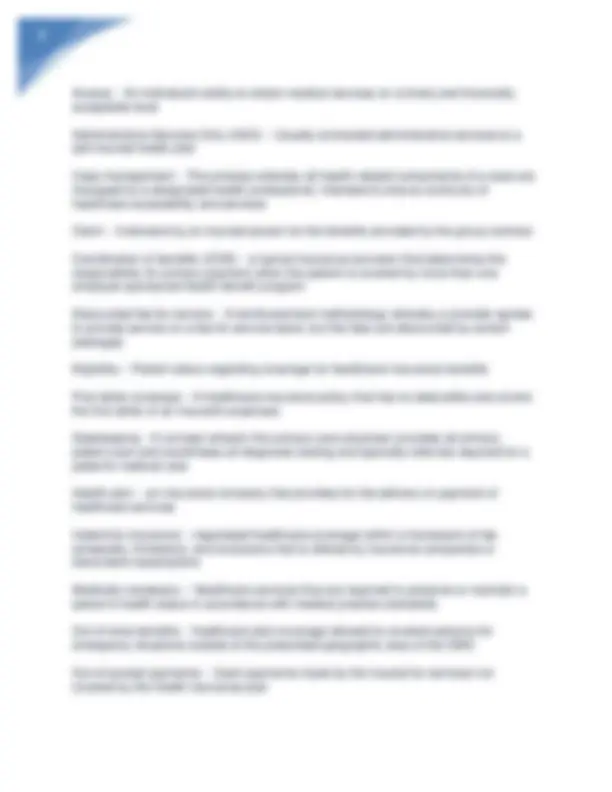
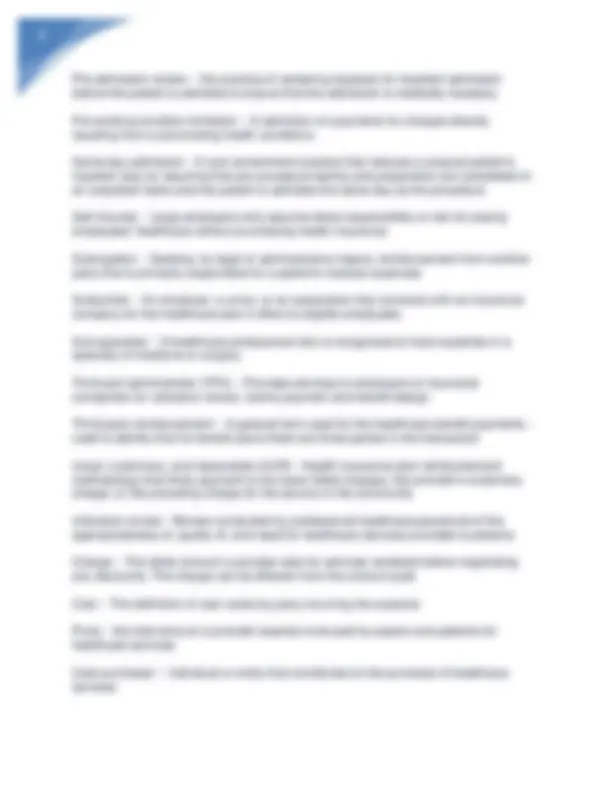
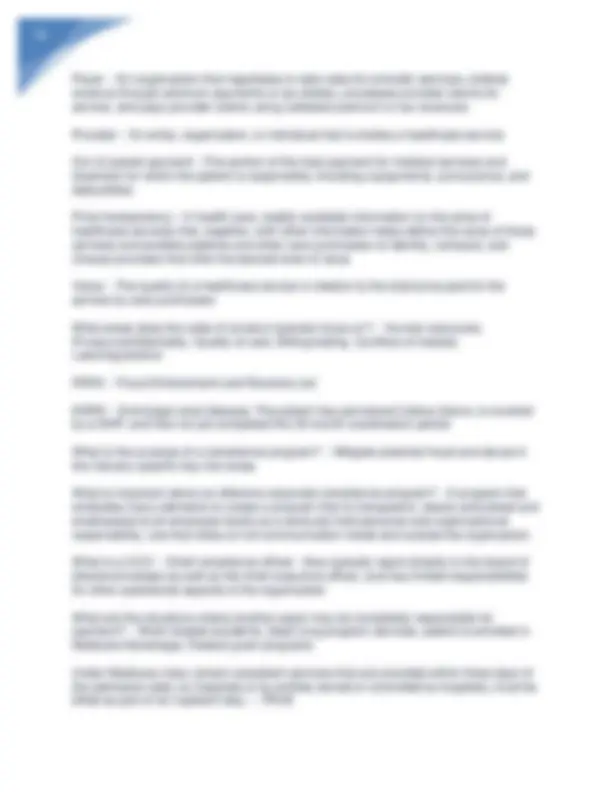
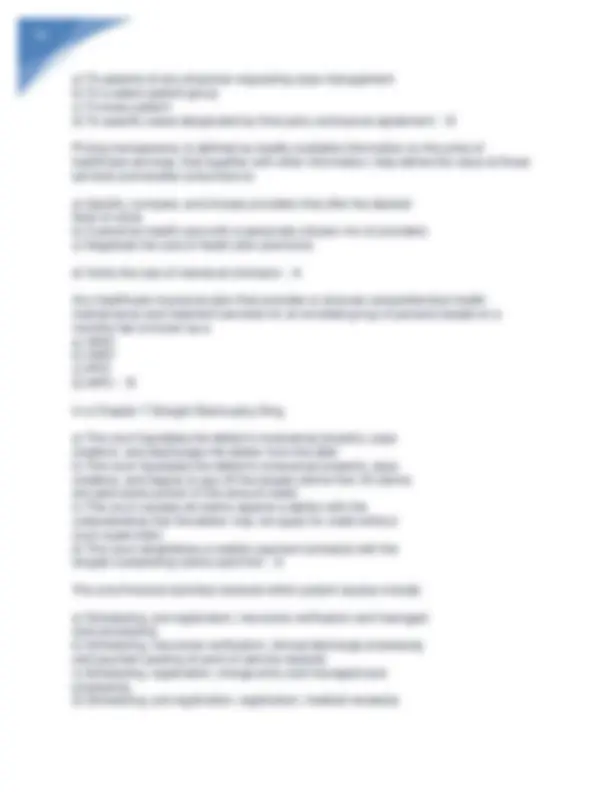
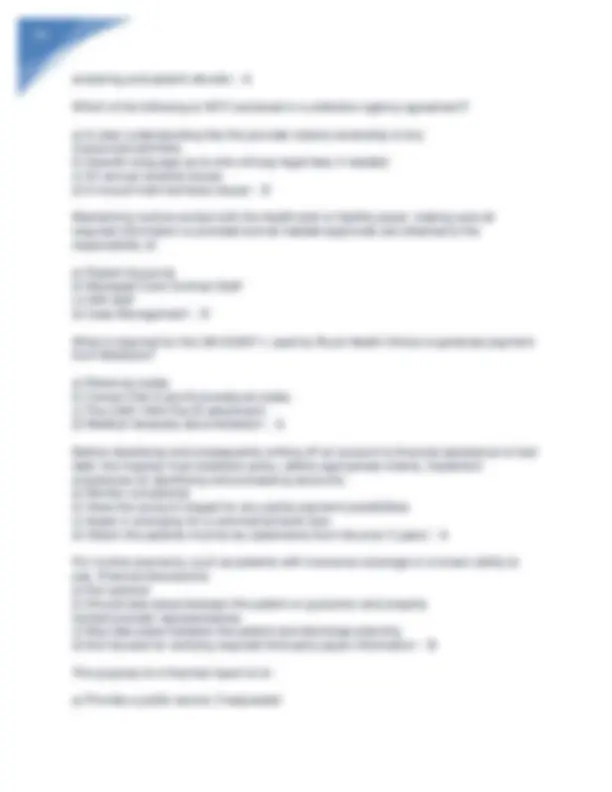
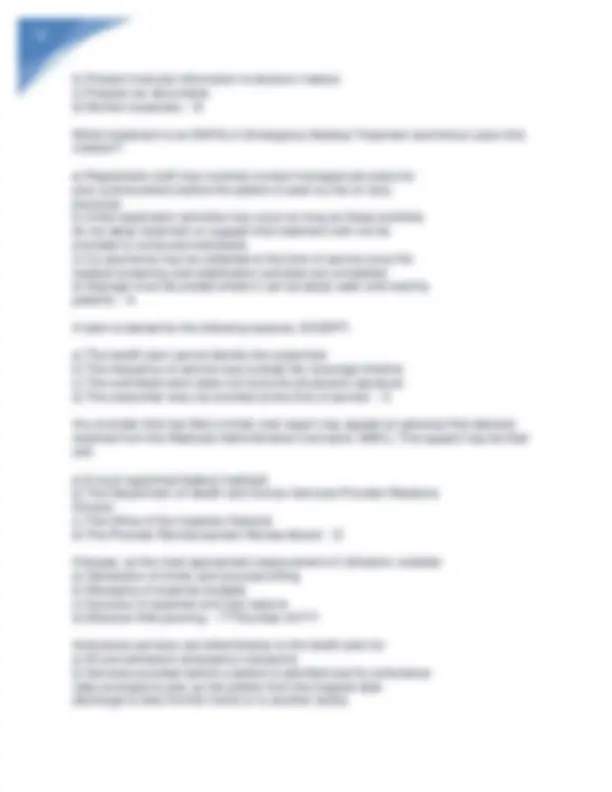
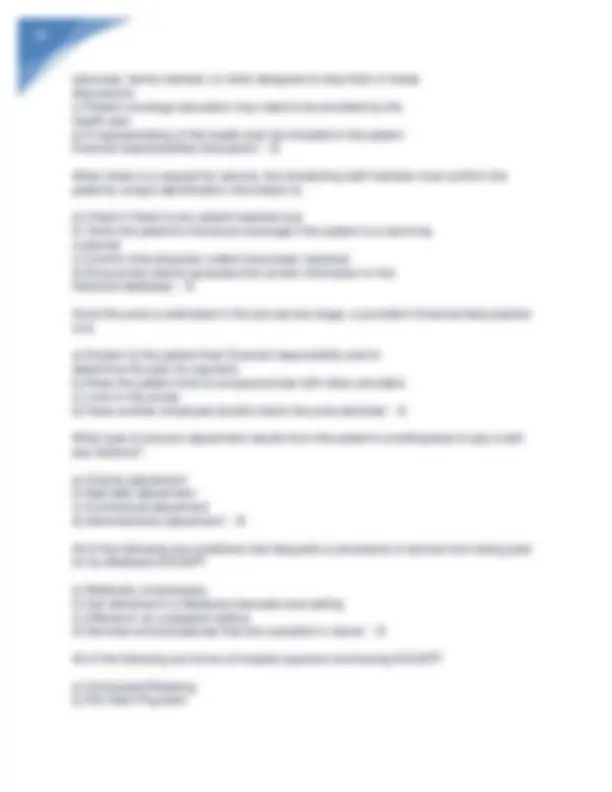
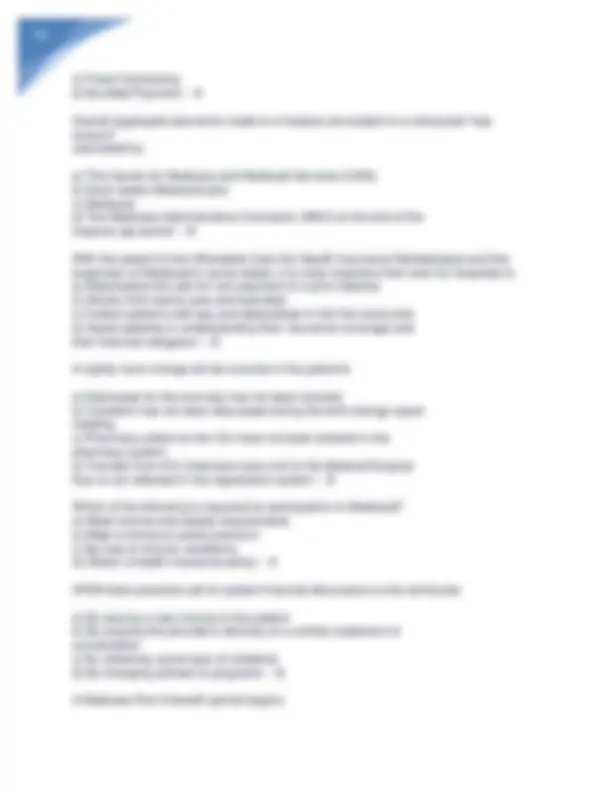

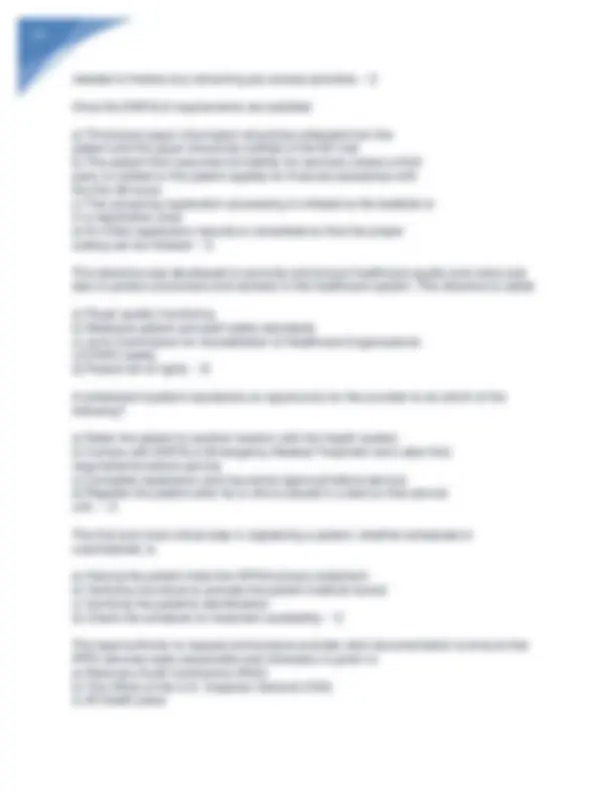
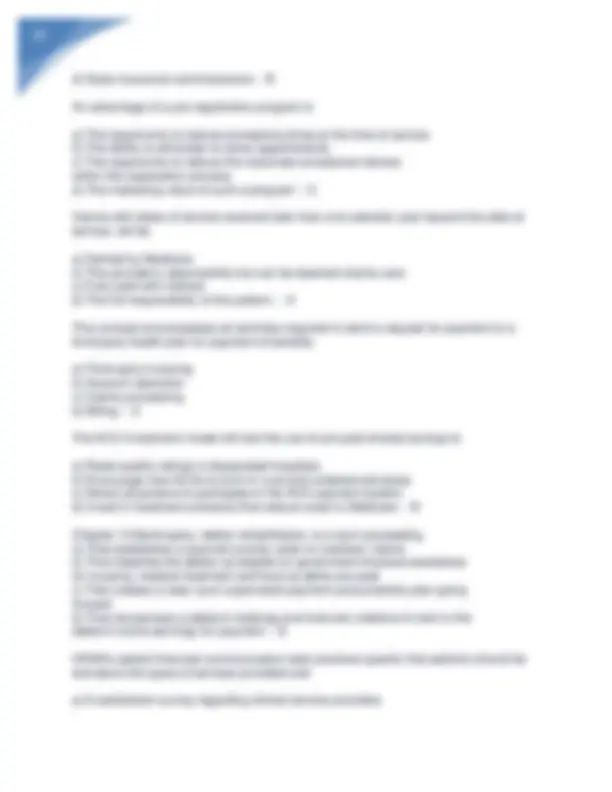
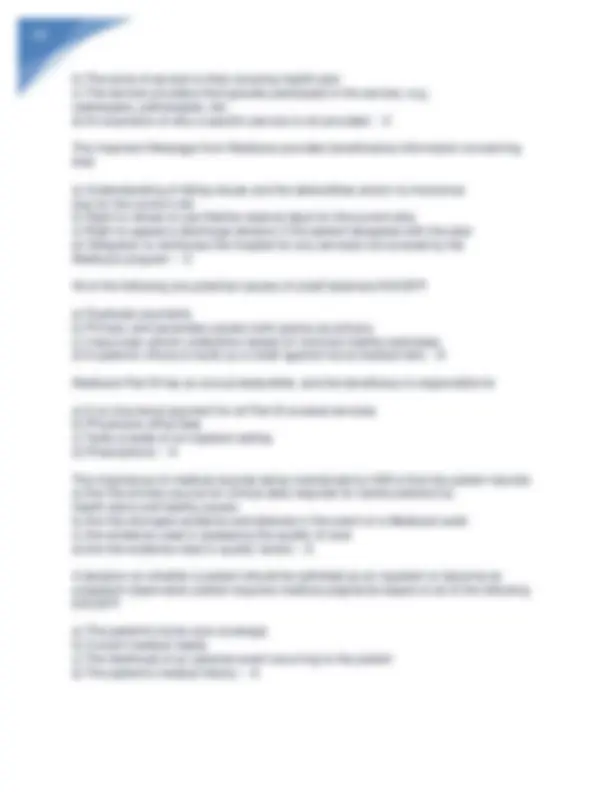
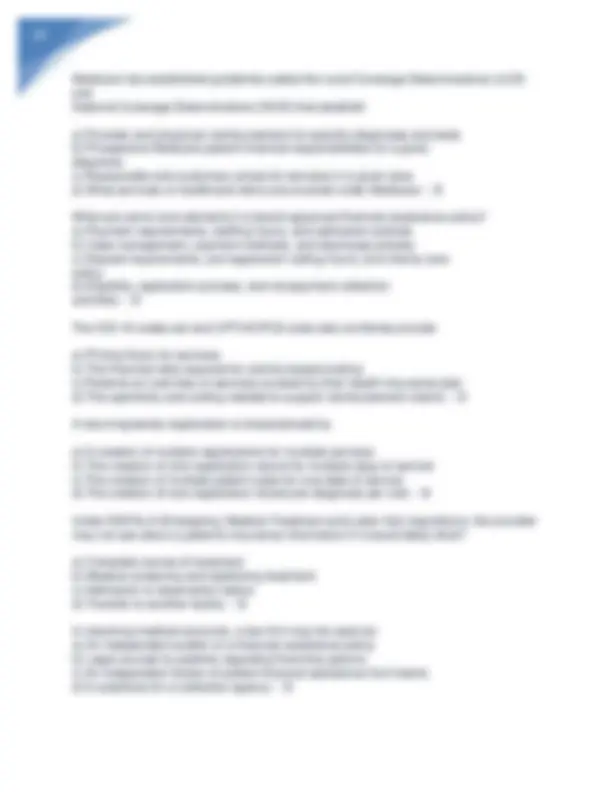
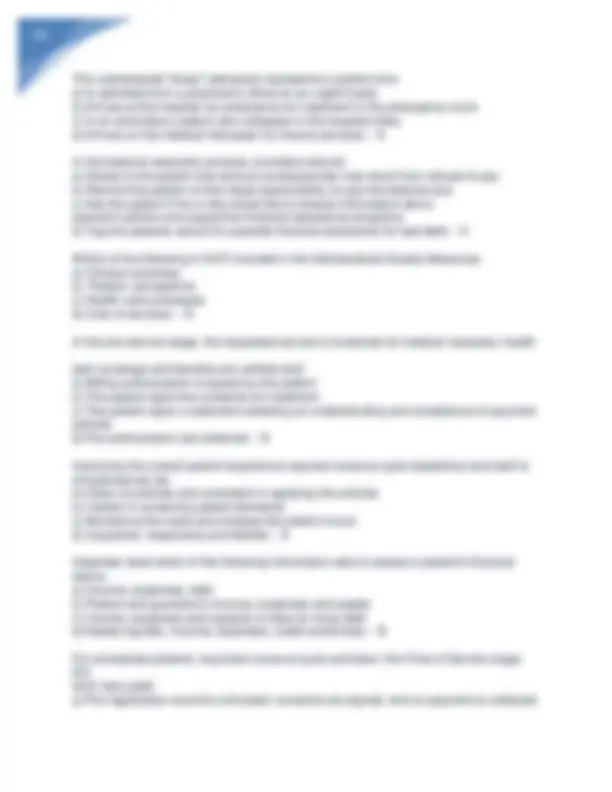
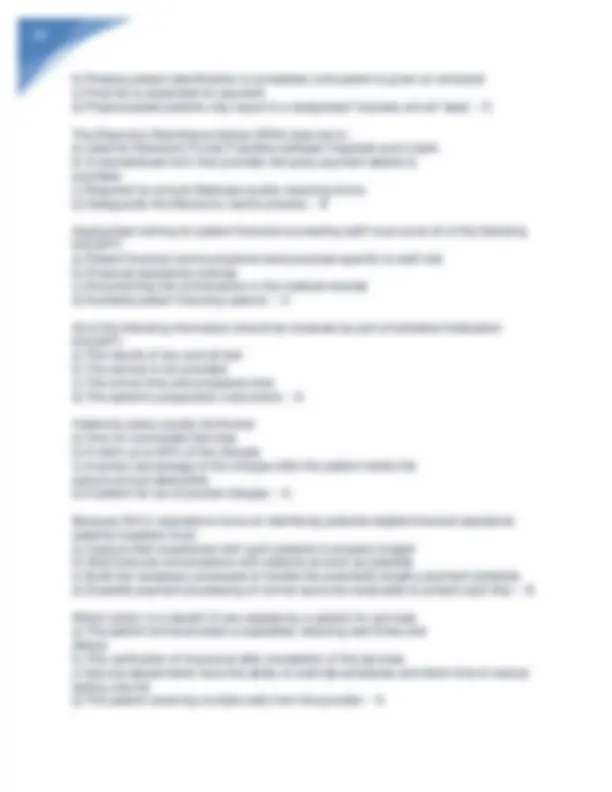
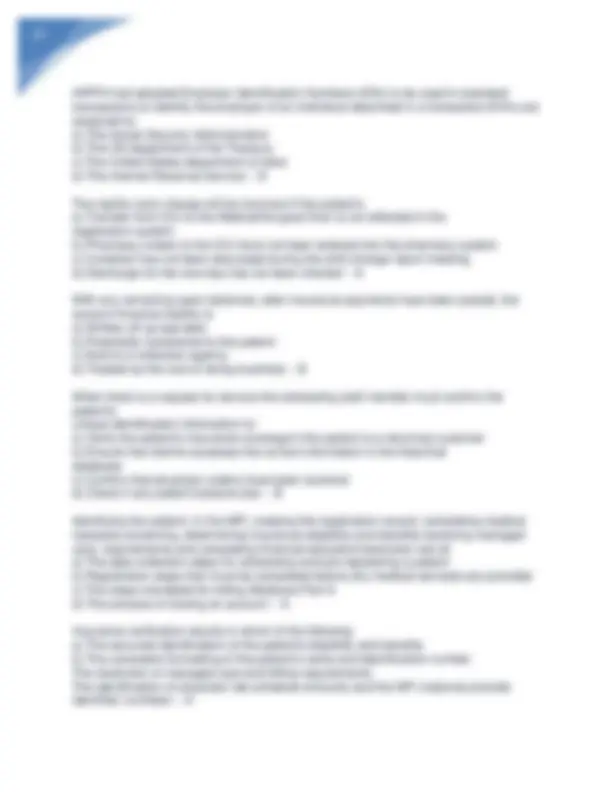
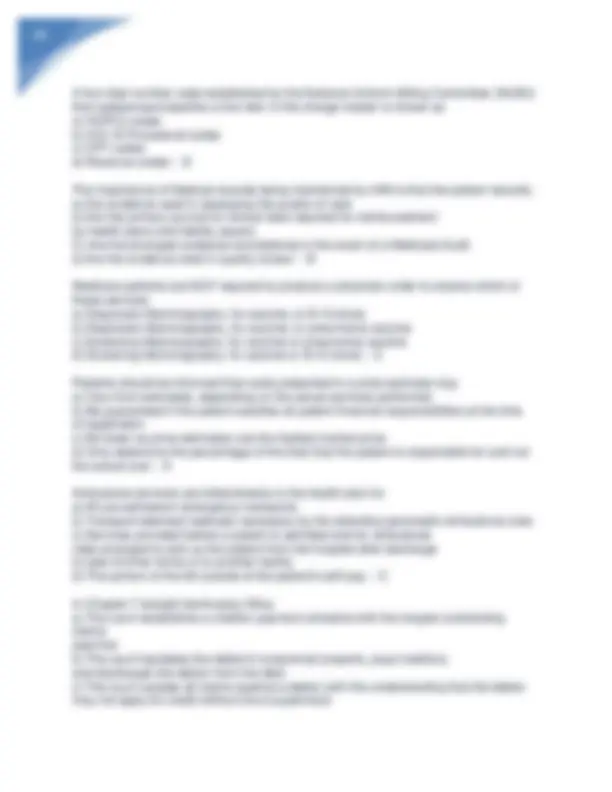
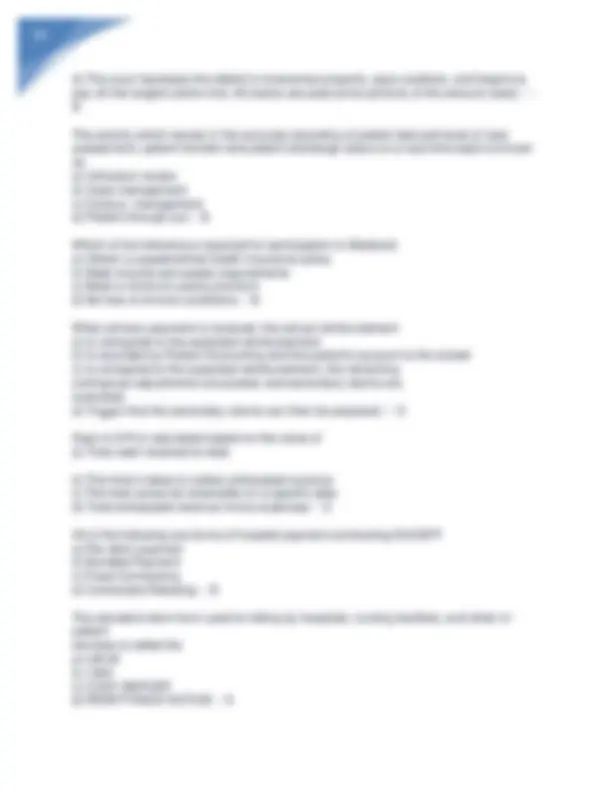
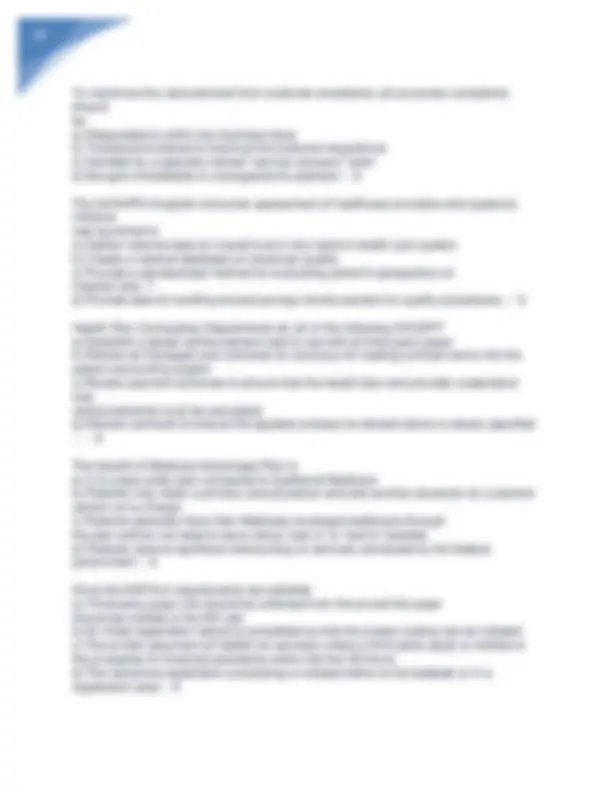
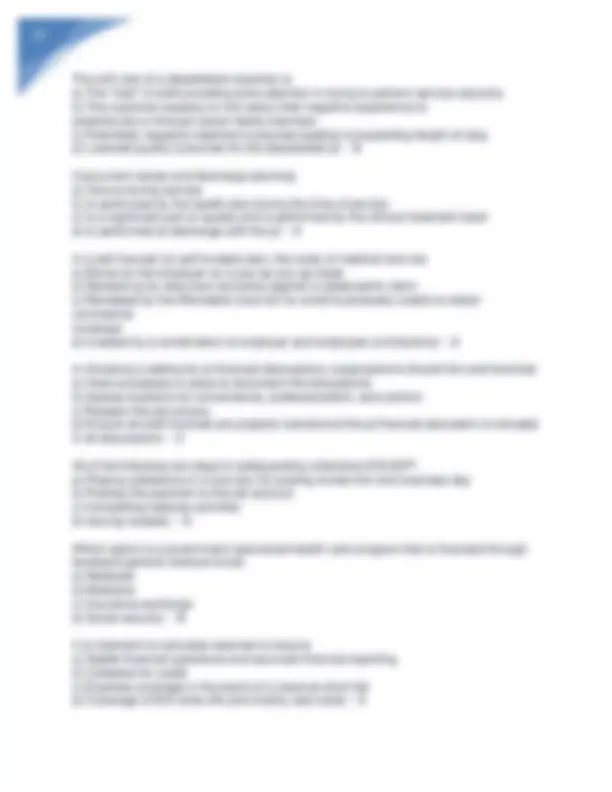
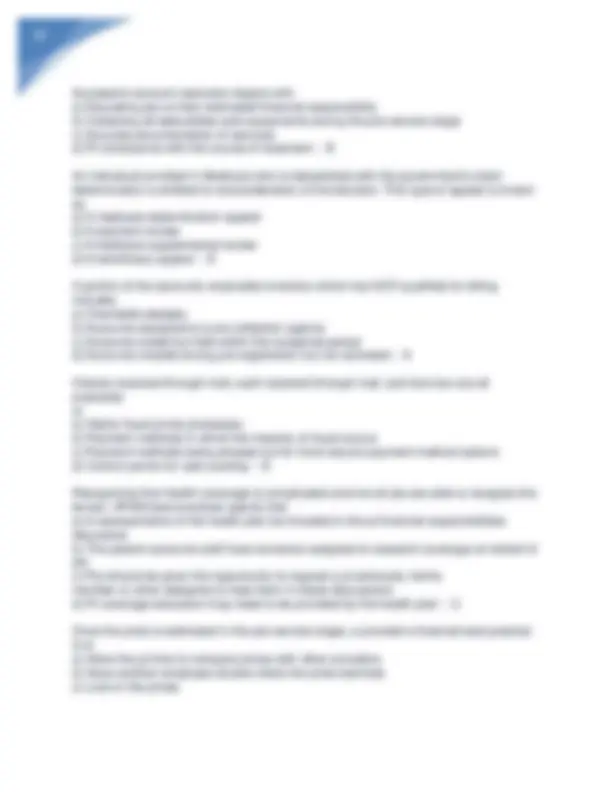
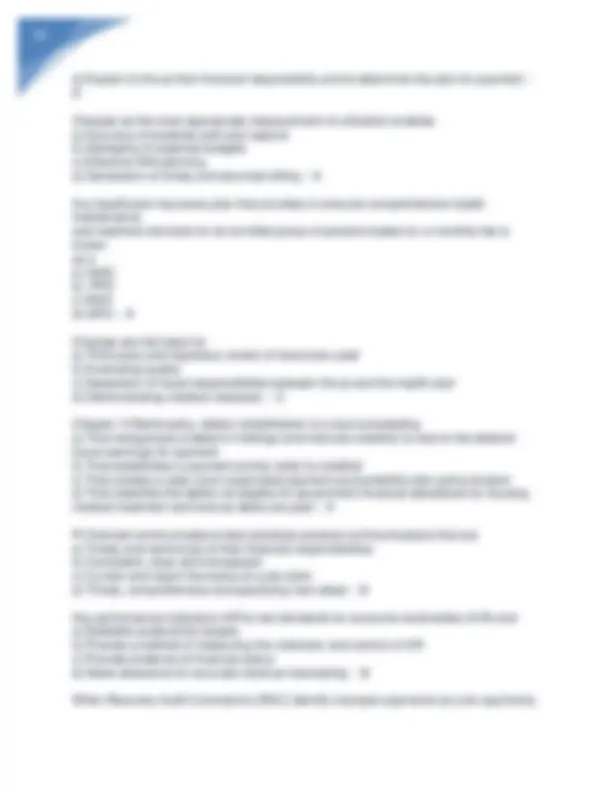
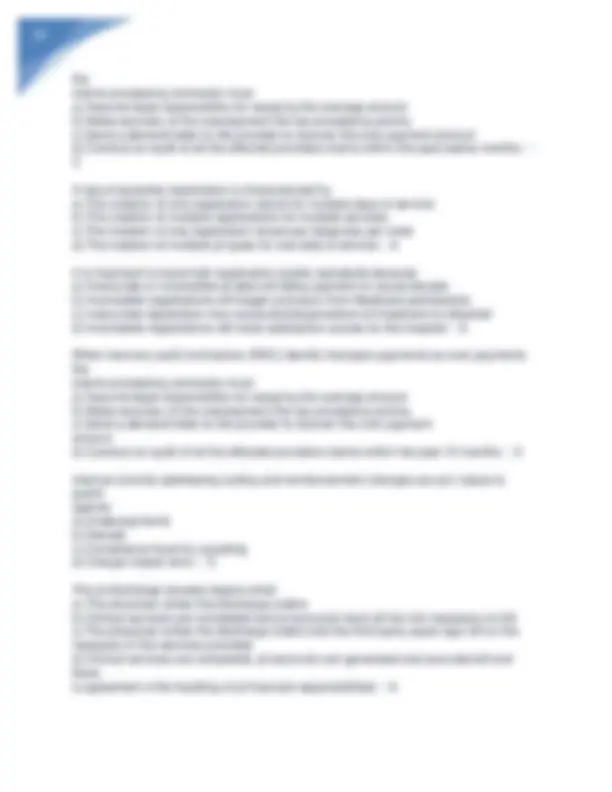
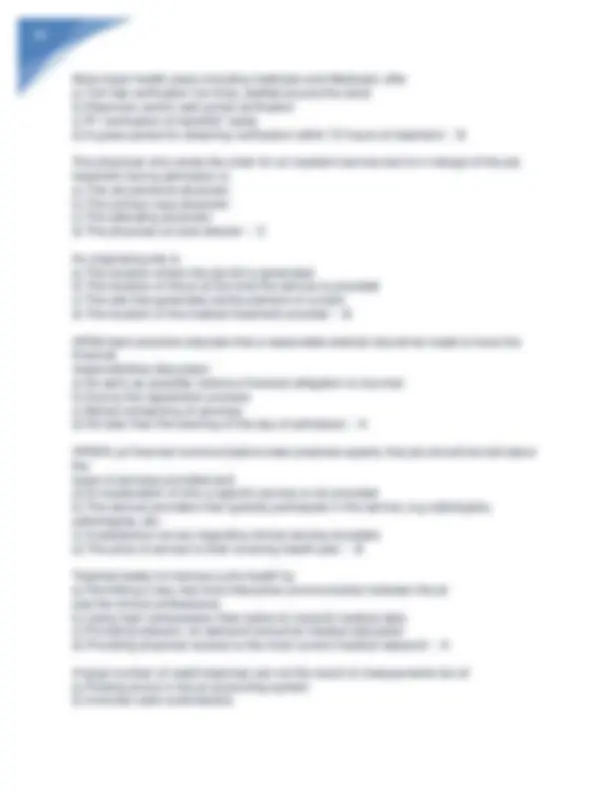
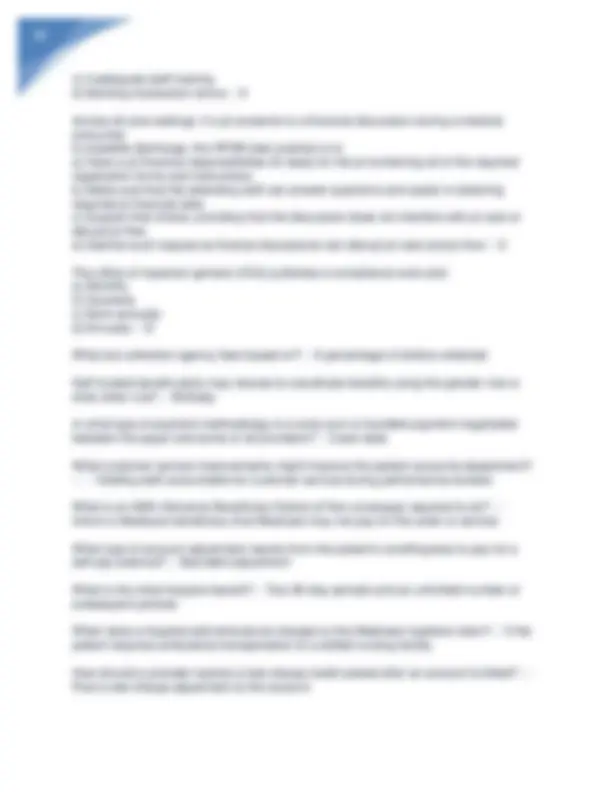
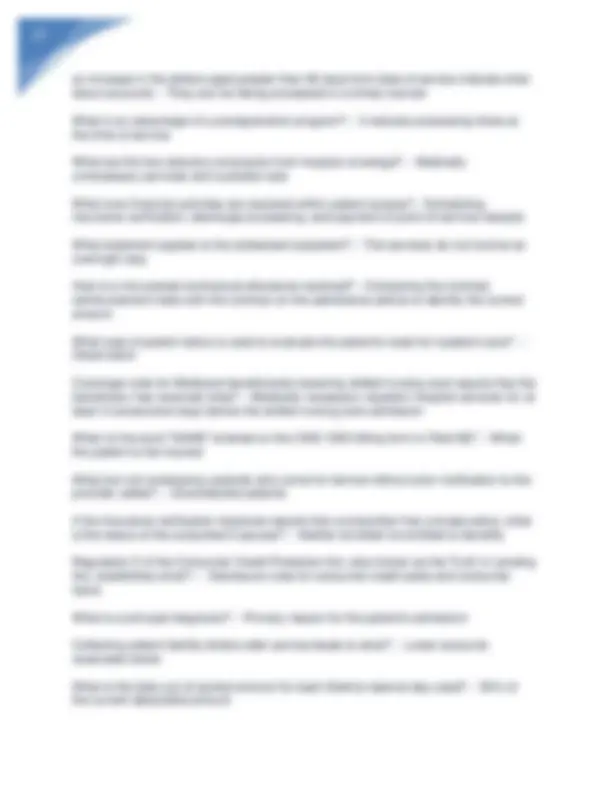
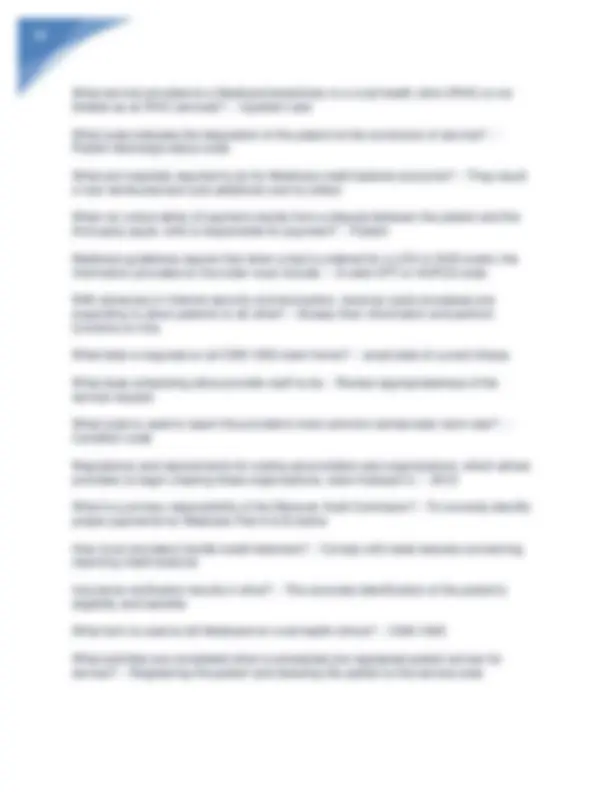
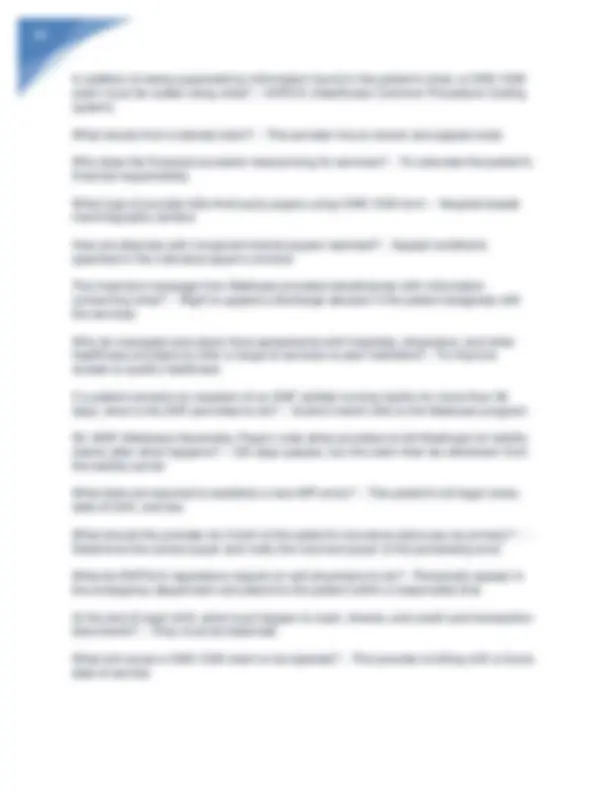
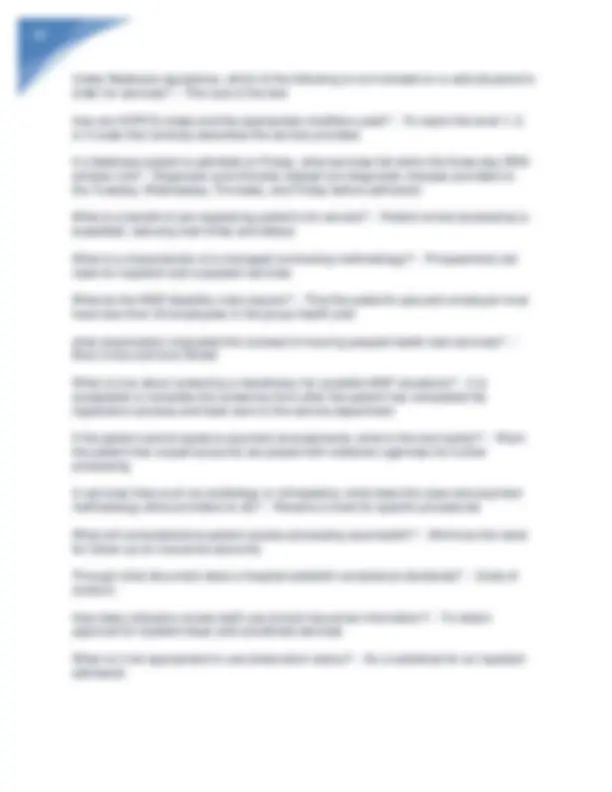
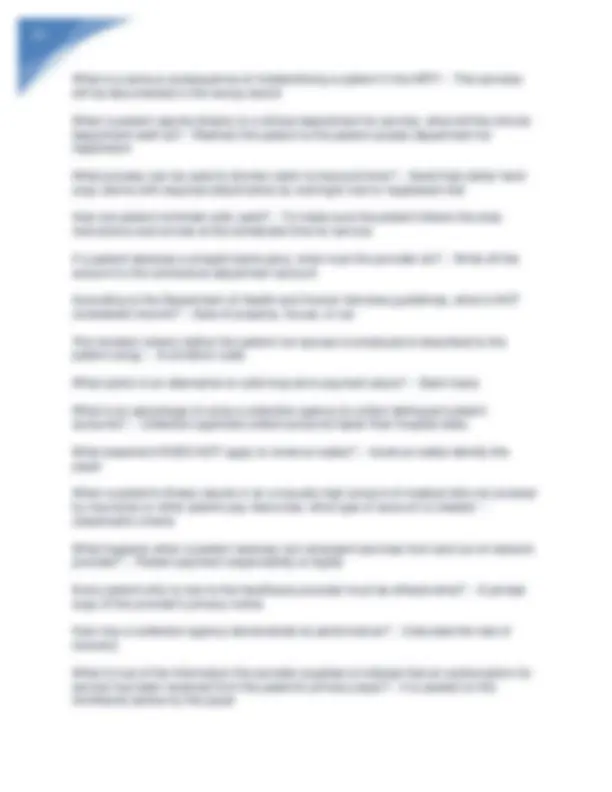

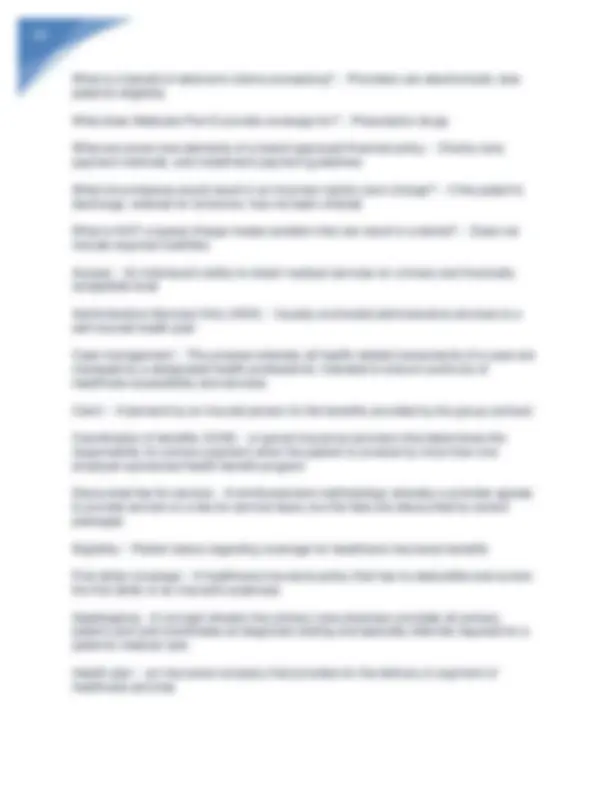
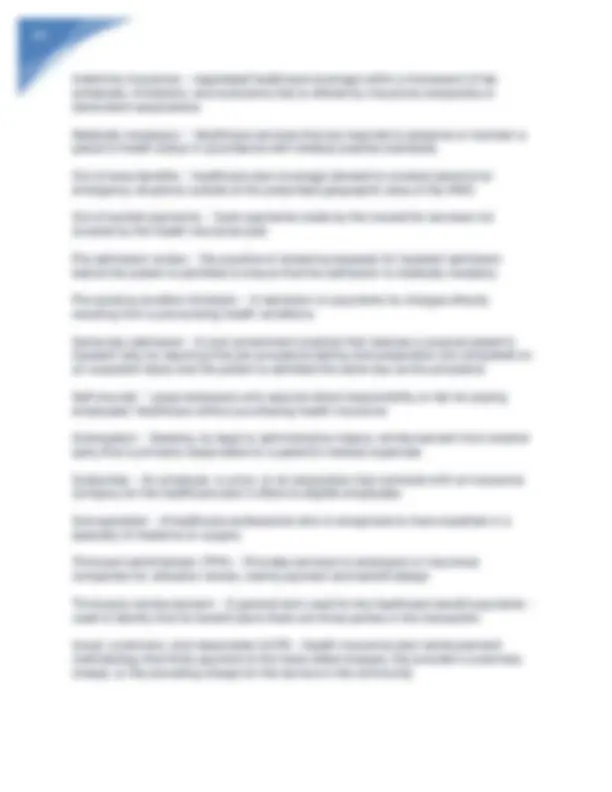
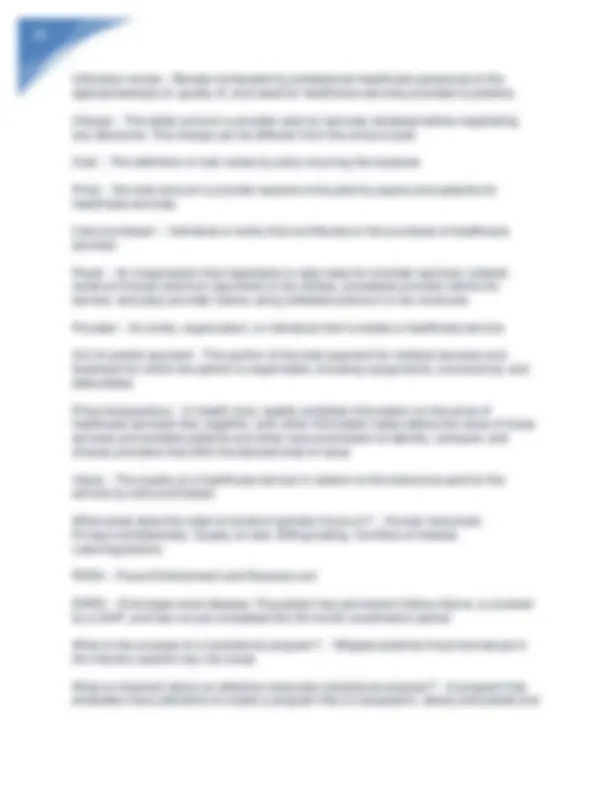
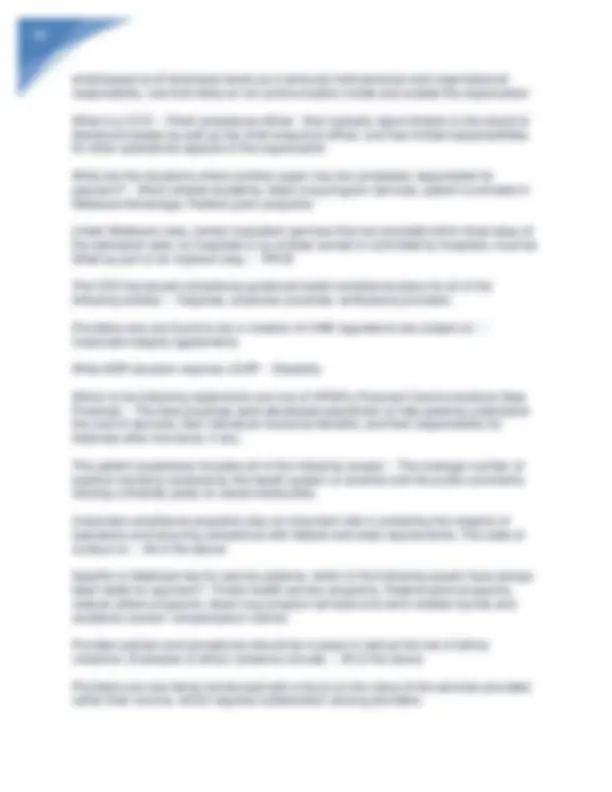
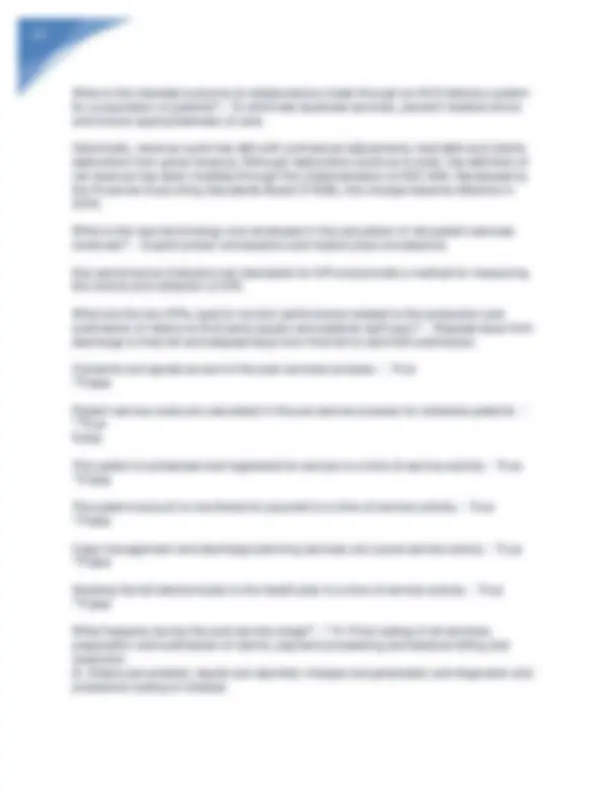
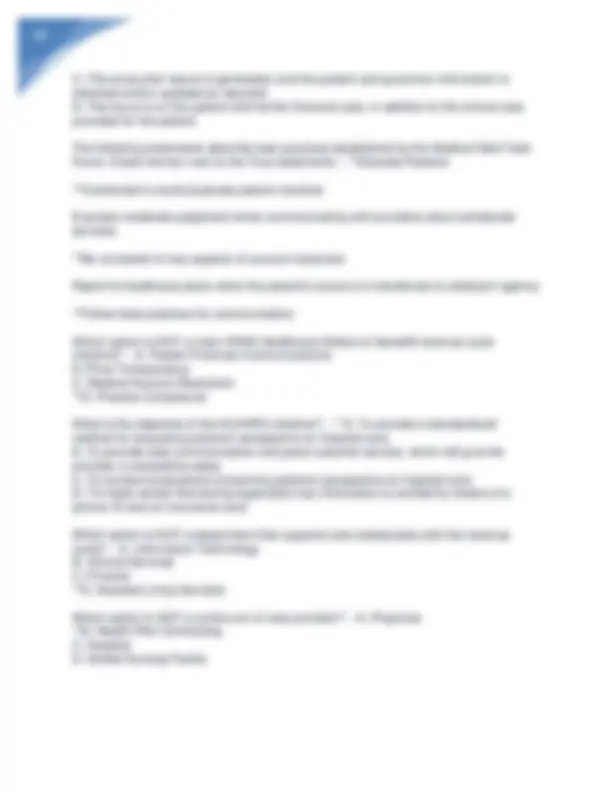
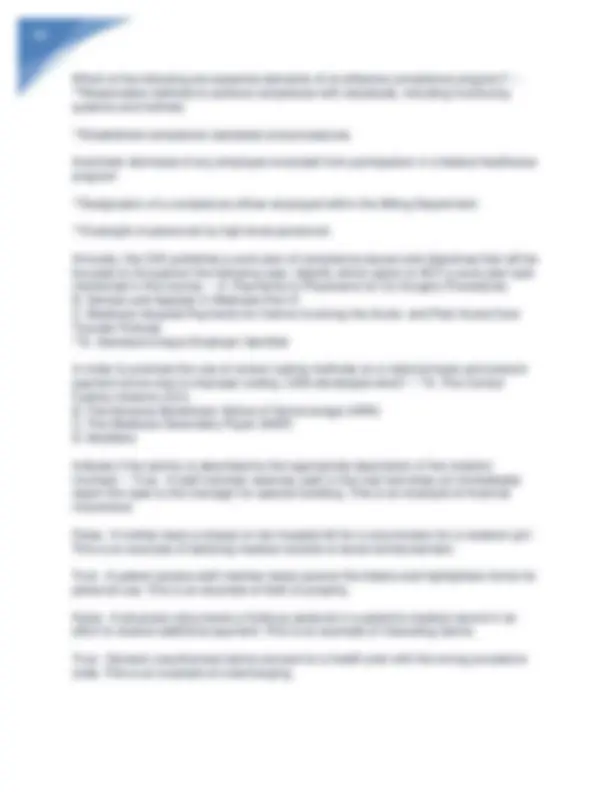

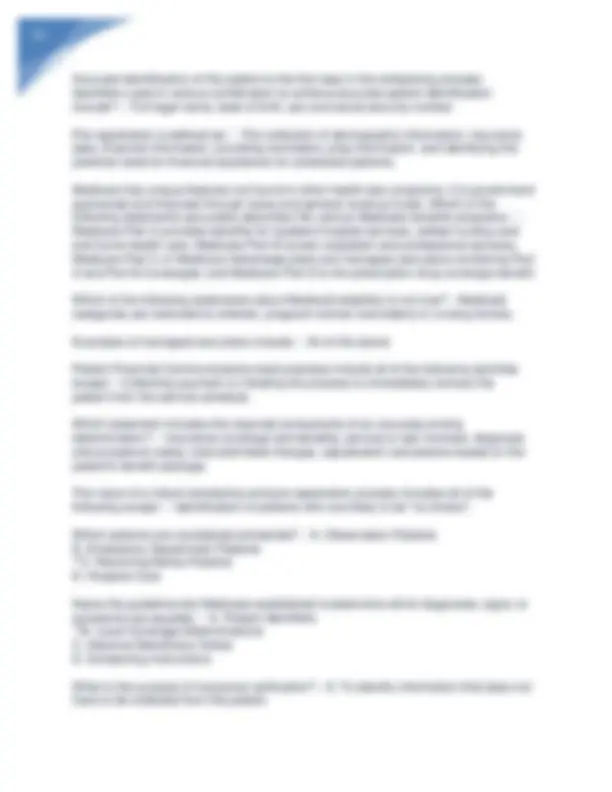
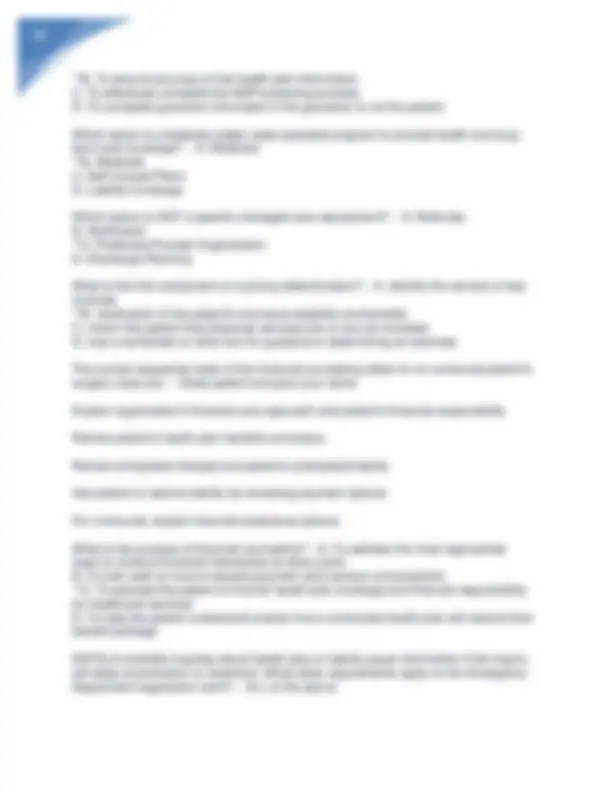
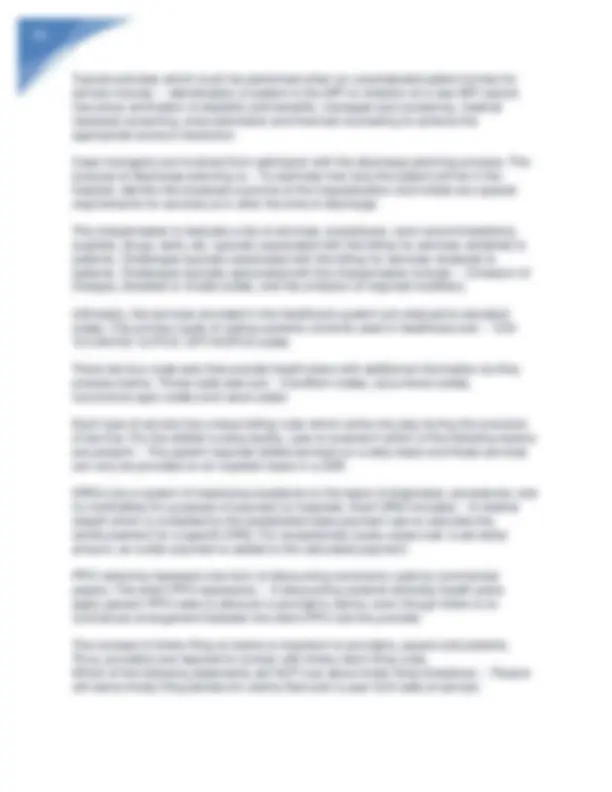

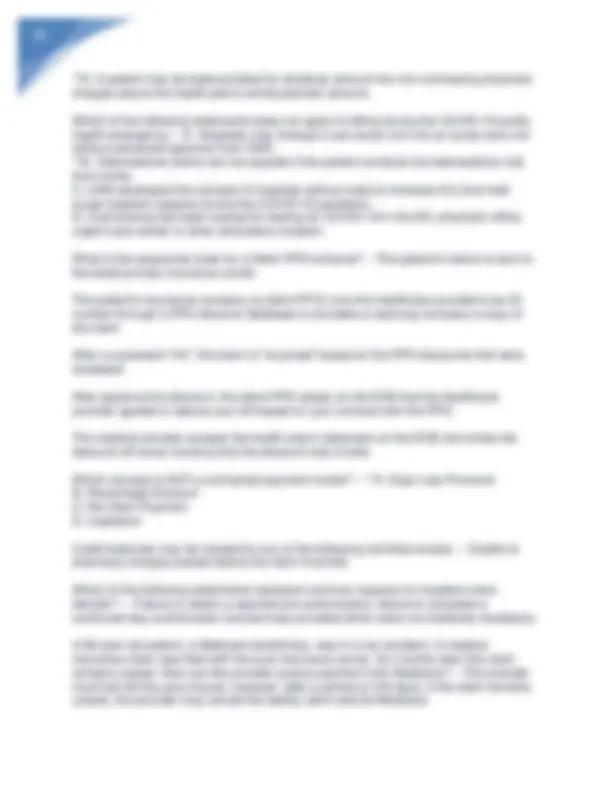
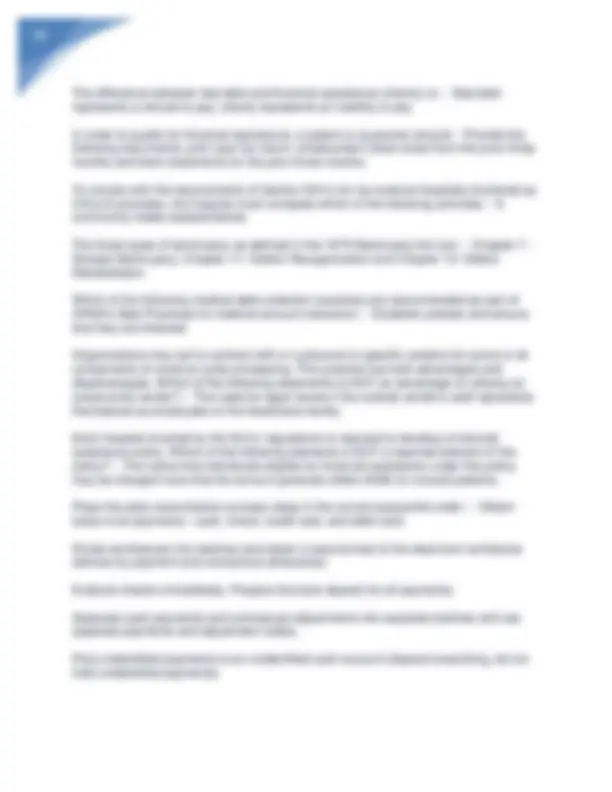
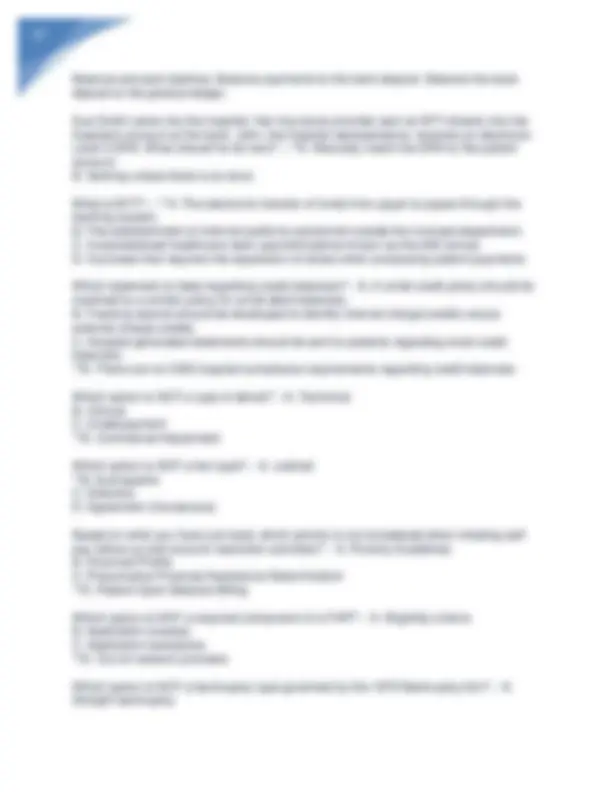
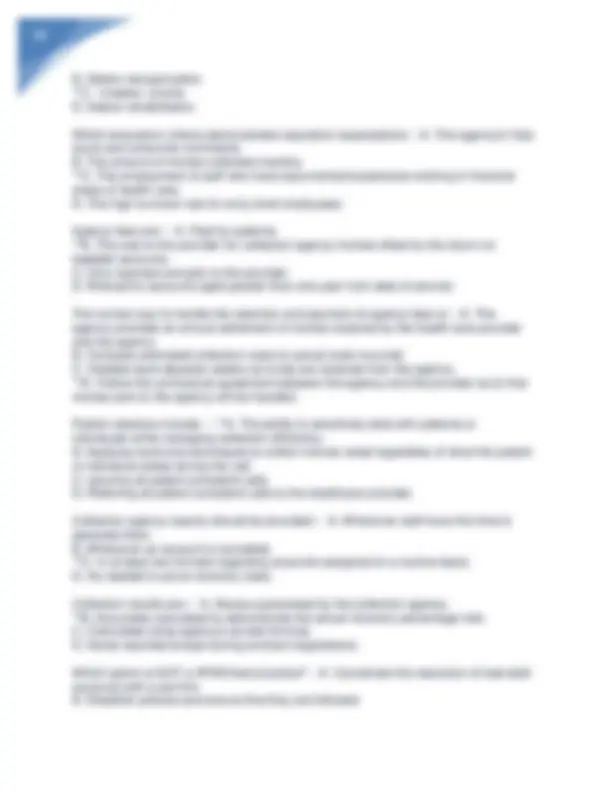

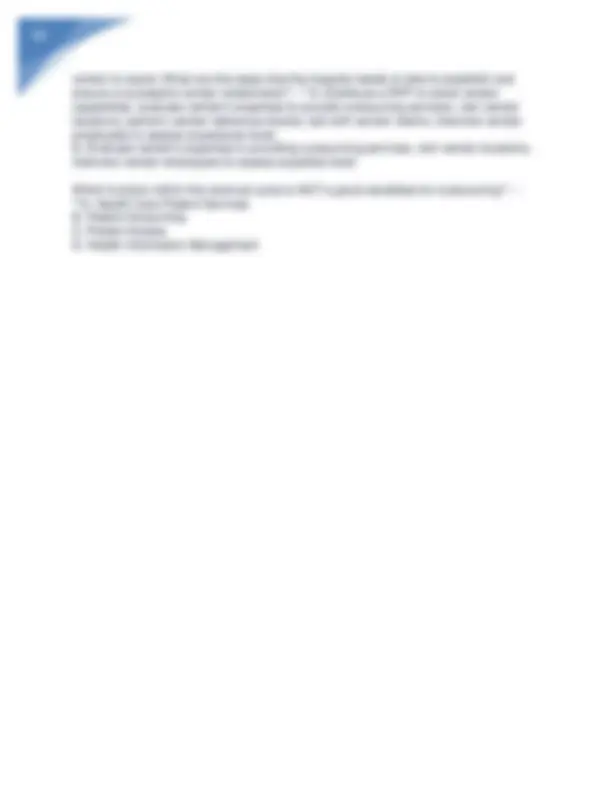


Study with the several resources on Docsity

Earn points by helping other students or get them with a premium plan


Prepare for your exams
Study with the several resources on Docsity

Earn points to download
Earn points by helping other students or get them with a premium plan
Community
Ask the community for help and clear up your study doubts
Discover the best universities in your country according to Docsity users
Free resources
Download our free guides on studying techniques, anxiety management strategies, and thesis advice from Docsity tutors
A list of questions and answers related to medical billing and coding. It covers topics such as collection agency fees, payment methodologies, patient access processing, MSP disability rules, and more. The document also includes information on the CRCR exam and the Certified Revenue Cycle Representative certification. It is a useful resource for students preparing for a medical billing and coding exam or for professionals looking to refresh their knowledge.
Typology: Exams
1 / 60

This page cannot be seen from the preview
Don't miss anything!





















































What are collection agency fees based on? - A percentage of dollars collected Self-funded benefit plans may choose to coordinate benefits using the gender rule or what other rule? - Birthday In what type of payment methodology is a lump sum or bundled payment negotiated between the payer and some or all providers? - Case rates What customer service improvements might improve the patient accounts department?
What statement applies to the scheduled outpatient? - The services do not involve an overnight stay How is a mis-posted contractual allowance resolved? - Comparing the contract reimbursement rates with the contract on the admittance advice to identify the correct amount What type of patient status is used to evaluate the patient's need for inpatient care? - Observation Coverage rules for Medicare beneficiaries receiving skilled nursing care require that the beneficiary has received what? - Medically necessary inpatient hospital services for at least 3 consecutive days before the skilled nursing care admission When is the word "SAME" entered on the CMS 1500 billing form in Field 0$? - When the patient is the insured What are non-emergency patients who come for service without prior notification to the provider called? - Unscheduled patients If the insurance verification response reports that a subscriber has a single policy, what is the status of the subscriber's spouse? - Neither enrolled not entitled to benefits Regulation Z of the Consumer Credit Protection Act, also known as the Truth in Lending Act, establishes what? - Disclosure rules for consumer credit sales and consumer loans What is a principal diagnosis? - Primary reason for the patient's admission Collecting patient liability dollars after service leads to what? - Lower accounts receivable levels What is the daily out-of-pocket amount for each lifetime reserve day used? - 50% of the current deductible amount What service provided to a Medicare beneficiary in a rural health clinic (RHC) is not billable as an RHC services? - Inpatient care What code indicates the disposition of the patient at the conclusion of service? - Patient discharge status code What are hospitals required to do for Medicare credit balance accounts? - They result in lost reimbursement and additional cost to collect When an undue delay of payment results from a dispute between the patient and the third party payer, who is responsible for payment? - Patient
How are disputes with nongovernmental payers resolved? - Appeal conditions specified in the individual payer's contract The important message from Medicare provides beneficiaries with information concerning what? - Right to appeal a discharge decision if the patient disagrees with the services Why do managed care plans have agreements with hospitals, physicians, and other healthcare providers to offer a range of services to plan members? - To improve access to quality healthcare If a patient remains an inpatient of an SNF (skilled nursing facility for more than 30 days, what is the SNF permitted to do? - Submit interim bills to the Medicare program.
What is a characteristic of a managed contracting methodology? - Prospectively set rates for inpatient and outpatient services What do the MSP disability rules require? - That the patient's spouse's employer must have less than 20 employees in the group health plan what organization originated the concept of insuring prepaid health care services? - Blue Cross and blue Shield What is true about screening a beneficiary for possible MSP situations? - It is acceptable to complete the screening form after the patient has completed the registration process and been sent to the service department If the patient cannot agree to payment arrangements, what is the next option? - Warn the patient that unpaid accounts are placed with collection agencies for further processing In services lines such as cardiology or orthopedics, what does the case-rate payment methodology allow providers to do? - Receive a fixed for specific procedures What will comprehensive patient access processing accomplish? - Minimize the need for follow-up on insurance accounts Through what document does a hospital establish compliance standards? - Code of conduct How does utilization review staff use correct insurance information? - To obtain approval for inpatient days and coordinate services When is it not appropriate to use observation status? - As a substitute for an inpatient admission What is a serious consequence of misidentifying a patient in the MPI? - The services will be documented in the wrong record When a patient reports directly to a clinical department for service, what will the clinical department staff do? - Redirect the patient to the patient access department for registration What process can be used to shorten claim turnaround time? - Send high-dollar hard- copy claims with required attachments by overnight mail or registered mail How are patient reminder calls used? - To make sure the patient follows the prep instructions and arrives at the scheduled time for service
What is a valid reason for a payer to delay a claim? - Failure to complete authorization requirements IF outpatient diagnostic services are provided within three days of the admission of a Medicare beneficiary to an IPPS (Inpatient Prospective Payment System) hospital, what must happen to these charges - They must be combined with the inpatient bill and paid under the MS-DRG system What do large adjustments require? - Manager-level approval What items are valid identifiers to establish a patient's identification? - Photo identification, date of birth, and social security number What must a provider do to qualify an account as a Medicare bad debts? - Pursue the account for 120 days and then refer it to an outside collection agency What restriction does a managed care plan place on locations that must be used if the plan is to pay for the services provided? - Site-of-service limitation What is an example of an outcome of the Patient Friendly Billing Project? - Redesigned patient billing statements using patient-friendly language What statement describes the APC (Ambulatory payment classification) system? - APC rates are calculated on a national basis and are wage-adjusted by geographic region What is a benefit of insurance verification? - Pre-certification or pre-authorization requirements are confirmed What is an effective tool to help staff collect payments at the time of service? - Develop scripts for the process of requesting payments What is a benefit of electronic claims processing? - Providers can electronically view patient's eligibility What does Medicare Part D provide coverage for? - Prescription drugs What are some core elements of a board-approved financial policy - Charity care, payment methods, and installment payment guidelines What circumstance would result in an incorrect nightly room charge? - If the patient's discharge, ordered for tomorrow, has not been charted What is NOT a typical charge master problem that can result in a denial? - Does not include required modifiers
Access - An individual's ability to obtain medical services on a timely and financially acceptable level Administrative Services Only (ASO) - Usually contracted administrative services to a self-insured health plan Case management - The process whereby all health-related components of a case are managed by a designated health professional. Intended to ensure continuity of healthcare accessibility and services Claim - A demand by an insured person for the benefits provided by the group contract Coordination of benefits (COB) - a typical insurance provision that determines the responsibility for primary payment when the patient is covered by more than one employer-sponsored health benefit program Discounted fee-for-service - A reimbursement methodology whereby a provider agrees to provide service on a fee for service basis, but the fees are discounted by certain packages Eligibility - Patient status regarding coverage for healthcare insurance benefits First dollar coverage - A healthcare insurance policy that has no deductible and covers the first dollar of an insured's expenses Gatekeeping - A concept wherein the primary care physician provides all primary patient care and coordinates all diagnostic testing and specialty referrals required for a patient's medical care Health plan - an insurance company that provides for the delivery or payment of healthcare services Indemnity insurance - negotiated healthcare coverage within a framework of fee schedules, limitations, and exclusions that is offered by insurance companies or benevolent associations Medically necessary - Healthcare services that are required to preserve or maintain a person's health status in accordance with medical practice standards Out-of-area benefits - healthcare plan coverage allowed to covered persons for emergency situations outside of the prescribed geographic area of the HMO Out-of-pocket payments - Cash payments made by the insured for services not covered by the health insurance plan
Payer - An organization that negotiates or sets rates for provider services, collects revenue through premium payments or tax dollars, processes provider claims for service, and pays provider claims using collected premium or tax revenues Provider - An entity, organization, or individual that furnishes a healthcare service Out of pocket payment - The portion of the total payment for medical services and treatment for which the patient is responsible, including copayments, coinsurance, and deductibles Price transparency - In health care, readily available information on the price of healthcare services that, together, with other information helps define the value of those services and enables patients and other care purchasers to identify, compare, and choose providers that offer the desired level of value Value - The quality of a healthcare service in relation to the total price paid for the service by care purchasers What areas does the code of conduct typically focus on? - Human resources. Privacy/confidentiality. Quality of care. Billing/coding. Conflicts of interest. Laws/regulations FERA - Fraud Enforcement and Recovery act ESRD - End-stage renal disease. The patient has permanent kidney failure, is covered by a GHP, and has not yet completed the 30 - month coordination period What is the purpose of a compliance program? - Mitigate potential fraud and abuse in the industry-specific key risk areas What is important about an effective corporate compliance program? - A program that embodies many elements to create a program that is transparent, clearly articulated and emphasized at all employee levels as a seriously held personal and organizational responsibility, one that relies on full communication inside and outside the organization What is a CCO - Chief compliance officer - they typically report directly to the board of directors/trustees as well as the chief executive officer, and has limited responsibilities for other operational aspects of the organization What are the situations where another payer may be completely responsible for payment? - Work-related accidents, black lung program services, patient is enrolled in Medicare Advantage, Federal grant programs Under Medicare rules, certain outpatient services that are provided within three days of the admission date, by hospitals or by entities owned or controlled by hospitals, must be billed as part of an inpatient stay. - TRUE
The OIG has issued compliance guidance/model compliance plans for all of the following entities: - hospices. physician practices. ambulance providers Providers who are found to be in violation of CMS regulations are subject to: - Corporate integrity agreements What MSP situation requires LGHP - Disability The disadvantages of outsourcing include all of the following EXCEPT: a) The impact of customer service or patient relations b) The impact of loss of direct control of accounts receivable services c) Increased costs due to vendor ineffectiveness d) Reduced internal staffing costs and a reliance on outsourced staff - D The Medicare fee-for service appeal process for both beneficiaries and providers includes all of the following levels EXCEPT: a) Medical necessity review by an independent physician's panel b) Judicial review by a federal district court c) Redetermination by the company that handles claims for Medicare d) Review by the Medicare Appeals Council (Appeals Council) - B Business ethics, or organizational ethics represent: a) The principles and standards by which organizations operate b) Regulations that must be followed by law c) Definitions of appropriate customer service d) The code of acceptable conduct - A A portion of the accounts receivable inventory which has NOT qualified for billing includes: a) Charitable pledges b) Accounts created during pre-registration but not activated c) Accounts coded but held within the suspense period d) Accounts assigned to a pre-collection agency - A Local Coverage Determinations (LCD) and National Coverage Determinations (NCD) are Medicare established guideline(s) used to determine: a) Medicare and Medicaid provider eligibility b) Medicare outpatient reimbursement rates c) Which diagnoses, signs, or symptoms are reimbursable
a) To patients of any physician requesting case management b) To a select patient group c) To every patient d) To specific cases designated by third party contractual agreement - B Pricing transparency is defined as readily available information on the price of healthcare services, that together with other information, help define the value of those services and enable consumers to a) Identify, compare, and choose providers that offer the desired level of value b) Customize health care with a personally chosen mix of providers c) Negotiate the cost of health plan premiums d) Verify the cost of individual clinicians - A Any healthcare insurance plan that provides or ensures comprehensive health maintenance and treatment services for an enrolled group of persons based on a monthly fee is known as a a) MSO b) HMO c) PPO d) GPO - B In a Chapter 7 Straight Bankruptcy filing a) The court liquidates the debtor's nonexempt property, pays creditors, and discharges the debtor from the debt b) The court liquidates the debtor's nonexempt property, pays creditors, and begins to pay off the largest claims first. All claims are paid some portion of the amount owed c) The court vacates all claims against a debtor with the understanding that the debtor may not apply for credit without court supervision d) The court establishes a creditor payment schedule with the longest outstanding claims paid first - A The core financial activities resolved within patient access include: a) Scheduling, pre-registration, insurance verification and managed care processing b) Scheduling, insurance verification, clinical discharge processing and payment posting of point of service receipts c) Scheduling, registration, charge entry and managed care processing d) Scheduling, pre-registration, registration, medical necessity
screening and patient refunds - A Which of the following is NOT contained in a collection agency agreement? a) A clear understanding that the provider retains ownership of any outsourced activities b) Specific language as to who will pay legal fees, if needed c) An annual renewal clause d) A mutual hold-harmless clause - D Maintaining routine contact with the health plan or liability payer, making sure all required information is provided and all needed approvals are obtained is the responsibility of: a) Patient Accounts b) Managed Care Contract Staff c) HIM staff d) Case Management - D What is required for the UB-04/837-I, used by Rural Health Clinics to generate payment from Medicare? a) Revenue codes b) Correct Part A and B procedural codes c) The CMS 1500 Part B attachment d) Medical necessity documentation - A Before classifying and subsequently writing off an account to financial assistance or bad debt, the hospital must establish policy, define appropriate criteria, implement procedures for identifying and processing accounts: a) Monitor compliance b) Have the account triaged for any partial payment possibilities c) Assist in arranging for a commercial bank loan d) Obtain the patients income tax statements from the prior 2 years - A For routine scenarios, such as patients with insurance coverage or a known ability to pay, financial discussions: a) Are optional b) Should take place between the patient or guarantor and properly trained provider representatives c) May take place between the patient and discharge planning d) Are focused on verifying required third-party payer information - B The purpose of a financial report is to: a) Provide a public record, if reqluested
c) The portion of the bill outside of the patient's self-pay d) Transports deemed medically necessary by the attending paramedic-ambulance crew - C An individual enrolled in Medicare who is dissatisfied with the government's claim determination is entitled to reconsideration of the decision. This type of appeal is known as a) A beneficiary appeal b) A Medicare supplemental review c) A payment review d) A Medicare determination appeal - A The nuanced data resulting from detailed ICD- 10 coding allows senior leadership to work with physicians to do all of the following EXCEPT: a) Drive significant improvements in the areas of quality and the patient experience b) Embrace new reimbursement models c) Improve outcomes d) Obtain higher compensation for physicians - D Duplicate payments occur: a) When providers re-bill claims based on nonpayment from the initial bill submission b) When service departments do not process charges with the organization's suspense days c) When the payer's coordination of benefits is not captured correctly at the time of patient registration d) When there are other healthcare claims in process and the anticipated deductibles and co-insurance amounts still show open but will be met by the in-process claims - a The Affordable Care Act legislated the development of Health Insurance Exchanges, where individuals and small businesses can a) Purchase qualified health benefit plans regardless of insured's health status b) Obtain price estimates for medical services c) Negotiate the price of medical services with providers d) Meet federal mandates for insurance coverage and obtain the corresponding tax deduction - A The most common resolution methods for credit balances include all of the following EXCEPT:
a) Designate the overpayment for charity care b) Submit the corrected claim to the payer incorporating credits c) Either send a refund or complete a takeback form as directed by the payer d) Determine the correct primary payer and notify incorrect payer of overpayment - A EFT (electronic funds transfer) is a) An electronic claim submission b) The record of payments in the hospital's accounting system c) An electronic confirmation that a payment is due d) An electronic transfer of funds from payer to payee - D Revenue cycle activities occurring at the point-of-service include all of the following EXCEPT: a) The monitoring of charges b) The provision of case management and discharge planning services c) Providing charges to the third-party payer as they are incurred d) The generation of charges - C Medicare beneficiaries remain in the same "benefit period" a) Up to hospitalization discharge b) Until the beneficiary is "hospitalization and/or skilled nursing facility-free" for 60 consecutive days c) Each calendar year d) Up to 60 days - B Key Performance Indicators (KPIs) set standards for accounts receivables (A/R) and a) Provide evidence of financial status b) Provide a method of measuring the collection and control of A/R c) Establish productivity targets d) Make allowance for accurate revenue forecasting - B Recognizing that health coverage is complicated and not all patients are able to navigate this terrain, HFMA best practices specify that a) The patient accounts staff have someone assigned to research coverage on behalf of patients b) Patients should be given the opportunity to request a patient
c) Fixed Contracting d) Bundled Payment - A Overall aggregate payments made to a hospice are subject to a computed "cap amount" calculated by: a) The Center for Medicare and Medicaid Services (CMS) b) Each state's Medicaid plan c) Medicare d) The Medicare Administrative Contractor (MAC) at the end of the hospice cap period - D With the advent of the Affordable Care Act Health Insurance Marketplaces and the expansion of Medicaid in some states, it is more important than ever for hospitals to a) Reschedule the visit for non-payment of a prior balance b) Strictly limit charity care and bad-debt c) Collect patient's self-pay and deductibles in the first encounter d) Assist patients in understanding their insurance coverage and their financial obligation - D A nightly room charge will be incorrect if the patient's a) Discharge for the next day has not been charted b) Condition has not been discussed during the shift change report meeting c) Pharmacy orders to the ICU have not been entered in the pharmacy system d) Transfer from ICU (intensive care unit) to the Medical/Surgical floor is not reflected in the registration system - D Which of the following is required for participation in Medicaid? a) Meet income and assets requirements b) Meet a minimum yearly premium c) Be free of chronic conditions d) Obtain a health insurance policy - A HFMA best practices call for patient financial discussions to be reinforced a) By issuing a new invoice to the patient b) By copying the provider's attorney on a written statement of conversation c) By obtaining some type of collateral d) By changing policies to programs - B A Medicare Part A benefit period begins:
a) With admission as an inpatient b) The first day in which an individual has not been a hospital inpatient not in a skilled nursing facility for the previous 60 days c) Upon the day the coverage premium is paid d) Immediately once authorization for treatment is provided by the health plan - A If further treatment can only be provided in a hospital setting, the patient's condition cannot be evaluated and/or treated within 24 hours, or if there is not an anticipation of improvement in the patient's condition with 24 hours, the patient a) Will remain in observation for up to 72 hours after which the patient is admitted as an inpatient b) Will be admitted as an inpatient c) Will be discharged and if needed, designated to a priority one outpatient status d) Will have his/her case reviewed by the attending physician, a consulting physician and the primary care physician and a future course of care will then be determined - B It is important to have high registration quality standards because a) Incomplete registrations will trigger exclusion from Medicare participation b) Incomplete registrations will raise satisfaction scores for the hospital c) Inaccurate registration may cause discharge before full treatment is obtained d) Inaccurate or incomplete patient data will delay payment or cause denials - D Medicare will only pay for tests and services that a) Constitute appropriate treatment and are fairly priced b) Have solid documentation c) Can be demonstrated as necessary d) Medicare determines are "reasonable and necessary" - D Room and bed charges are typically posted a) From case management reports generated for contracted payers b) Through the case management daily resource report c) At the end of each business day d) From the midnight census - D The process of creating the pre=registration record ensures a) Ability to pursue extraordinary collection activities b) Early and productive communication with a third-party payer c) Accurate billing d) That access staff will have the compete and valid information